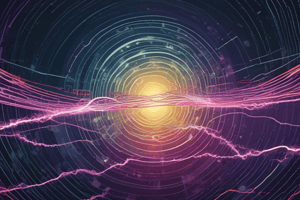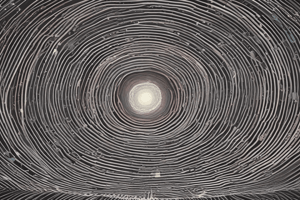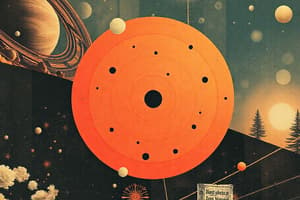Podcast
Questions and Answers
What is the term for the region around a magnet where magnetic force acts on magnetic materials?
What is the term for the region around a magnet where magnetic force acts on magnetic materials?
What method is used to visualize the magnetic field pattern around a magnet?
What method is used to visualize the magnetic field pattern around a magnet?
When two opposite poles of magnets are brought together, what type of magnetic field pattern is produced?
When two opposite poles of magnets are brought together, what type of magnetic field pattern is produced?
What happens to the magnetic field patterns of two magnets when they are brought close to each other?
What happens to the magnetic field patterns of two magnets when they are brought close to each other?
Signup and view all the answers
What ancient black stone, known for attracting iron, is related to the origin of the word 'magnet'?
What ancient black stone, known for attracting iron, is related to the origin of the word 'magnet'?
Signup and view all the answers
How does the distance between the lines of force relate to the magnetic strength in a magnetic field?
How does the distance between the lines of force relate to the magnetic strength in a magnetic field?
Signup and view all the answers
What is the primary composition of the Earth's core that influences its magnetic field?
What is the primary composition of the Earth's core that influences its magnetic field?
Signup and view all the answers
What part of the Earth's core is made of solid metal?
What part of the Earth's core is made of solid metal?
Signup and view all the answers
Which of the following correctly describes the relationship between magnetic north and geographic north?
Which of the following correctly describes the relationship between magnetic north and geographic north?
Signup and view all the answers
What was one of the first known uses of a magnet in direction-finding?
What was one of the first known uses of a magnet in direction-finding?
Signup and view all the answers
How does the Earth's spinning core contribute to the production of its magnetic field?
How does the Earth's spinning core contribute to the production of its magnetic field?
Signup and view all the answers
Who was the first scientist known for studying magnets for navigation?
Who was the first scientist known for studying magnets for navigation?
Signup and view all the answers
What did William Gilbert discover about the magnetic needle's behavior?
What did William Gilbert discover about the magnetic needle's behavior?
Signup and view all the answers
How did Hans Christian Ørsted contribute to the understanding of magnetism and electricity?
How did Hans Christian Ørsted contribute to the understanding of magnetism and electricity?
Signup and view all the answers
In Gilbert's experiments, how did the dip of the magnetic needle vary?
In Gilbert's experiments, how did the dip of the magnetic needle vary?
Signup and view all the answers
What happens when an electric current passes through a wire?
What happens when an electric current passes through a wire?
Signup and view all the answers
What do lines of force in magnetic field diagrams indicate?
What do lines of force in magnetic field diagrams indicate?
Signup and view all the answers
Which of the following statements about Gilbert's findings is true?
Which of the following statements about Gilbert's findings is true?
Signup and view all the answers
What occurs when a wire is coiled and connected in a circuit?
What occurs when a wire is coiled and connected in a circuit?
Signup and view all the answers
What did Gilbert's experiment with a lodestone sphere demonstrate?
What did Gilbert's experiment with a lodestone sphere demonstrate?
Signup and view all the answers
What was a misconception disproven by William Gilbert?
What was a misconception disproven by William Gilbert?
Signup and view all the answers
What happens to the lines of force in a magnetic field as the field strength increases?
What happens to the lines of force in a magnetic field as the field strength increases?
Signup and view all the answers
Flashcards
Magnetic Field
Magnetic Field
The area around a magnet where magnetic forces act on magnetic materials.
Magnetic Field Pattern
Magnetic Field Pattern
The arrangement of iron filings that show the magnetic field around a magnet.
Lines of Force
Lines of Force
Lines that show the direction and strength of the magnetic field.
Magnetic Strength
Magnetic Strength
Signup and view all the flashcards
Interaction of Magnetic Fields
Interaction of Magnetic Fields
Signup and view all the flashcards
Earth's Magnetic Field
Earth's Magnetic Field
Signup and view all the flashcards
Lodestone
Lodestone
Signup and view all the flashcards
Earth's Core
Earth's Core
Signup and view all the flashcards
Magnetic Field Generation
Magnetic Field Generation
Signup and view all the flashcards
Geographic Poles
Geographic Poles
Signup and view all the flashcards
Magnetic North
Magnetic North
Signup and view all the flashcards
Magnetic vs. Geographic Poles
Magnetic vs. Geographic Poles
Signup and view all the flashcards
Magnetic Compass Improvement
Magnetic Compass Improvement
Signup and view all the flashcards
William Gilbert
William Gilbert
Signup and view all the flashcards
Earth as a Magnet
Earth as a Magnet
Signup and view all the flashcards
Magnetic Dip
Magnetic Dip
Signup and view all the flashcards
Hans Christian Ørsted
Hans Christian Ørsted
Signup and view all the flashcards
Electric Current and Magnetism
Electric Current and Magnetism
Signup and view all the flashcards
Magnetic Field Lines
Magnetic Field Lines
Signup and view all the flashcards
Magnetic Field around a Coil
Magnetic Field around a Coil
Signup and view all the flashcards
Modern Compass Applications
Modern Compass Applications
Signup and view all the flashcards
Study Notes
Magnetism Basics
- Origin of "Magnet": The word "magnet" originates from the ancient region of Magnesia (now part of Turkey).
- Lodestone: Large numbers of black stones were found in the region that could attract iron. These stones were called lodestones or leading stones because they could be used for navigation and eventually for making compasses.
- Magnetite: The mineral form of these stones is magnetite.
- Magnetic Field: The region around a magnet where magnetic force acts on magnetic materials.
- Showing Magnetic Field: Iron filings sprinkled on a piece of card laid over a magnet line up to show the magnetic field pattern, particularly the lines of force that arch between the poles.
Magnetic Field Strength
- Distance and Strength: The distance between lines of force in the magnetic field can indicate strength. The closer the lines, the stronger the field.
Interaction of Magnetic Fields
- Similar Poles: If two similar magnetic poles are brought together, a specific pattern of interaction develops between them.
- Opposing Poles: If two opposing magnetic poles are brought together, the pattern of interaction will differ from that of similar poles.
- Magnetic Field Patterns Change: The magnetic field pattern of one magnet changes when another magnet is brought nearby.
The Earth's Magnetic Field
- Inner and Outer Core: The core of the Earth is comprised of an inner core made of solid iron and nickel and an outer core made of liquid iron and nickel. They move at different speeds, which creates the Earth's magnetic field.
- Earth's Magnetic Axis: The magnetic axis of the Earth is slightly offset from its geographic axis.
- Geographic vs Magnetic Poles: The geographic poles (fixed locations) are different from the magnetic poles (which change position slightly each year).
Early Discoveries of Magnetism
- Ancient Chinese (Luopan): Ancient Chinese civilization likely pioneered the use of magnets for navigation. A compass-like device called a luopan was used, utilizing south-pointing magnetic direction to assist in architecture.
- Shen Kuo: The first evidence of scientific investigation into magnetism is found in the written works of Chinese scientist Shen Kuo.
- Petrus Peregrinus / Peter the Pilgrim: A 13th-century French engineer experimented on magnets and magnets' attractive and repulsive properties.
- William Gilbert: An English scientist from the 16th/17th century who accurately described the Earth as a giant magnet.
Magnetism and Electricity
- Hans Christian Ørsted: He noticed a connection between electricity and magnetism: a compass needle moved when an electric current flowed nearby.
- Electric Current and Magnetic Field: An electric current passing through a wire creates a magnetic field around the wire. The strength of the field varies at different locations.
- Plotting a Magnetic Field: The pattern of the field can be plotted using compasses and iron filings.
- Electromagnets: A coil of wire surrounding a piece of iron can create an electromagnet. Current through the coil induces magnetism in the iron, and the field disappears when current stops.
- Electromagnet Applications: Electromagnets are used in a variety of devices, such as scrapyards (moving cars and steel).
Making and Testing Electromagnets
- Materials: A nail, copper wire, switch, batteries, clamp and stand, and paper clips.
- Creating Electromagnet: Wind the copper wire around the iron core, ensuring tight turns in the same direction.
- Testing Electromagnet: Set up circuits using differing cell configurations and observe how an electromagnet's strength (measured by the number of paper clips lifted) changes based on the number of cells. This experiment would vary the strength of the electromagnet based on the amount of electricity flowing through the coil.
Studying That Suits You
Use AI to generate personalized quizzes and flashcards to suit your learning preferences.
Related Documents
Description
Test your knowledge on the fundamentals of magnetism, including the origin of the term 'magnet' and the properties of magnetic fields. Explore concepts such as magnetic strength and the interaction of magnetic poles.




